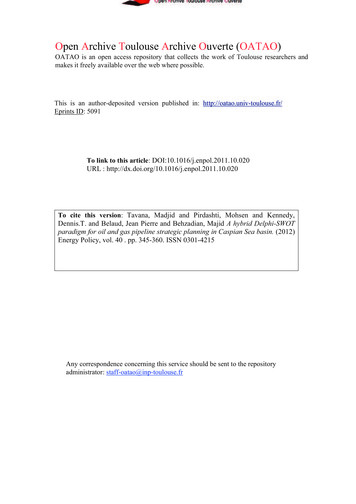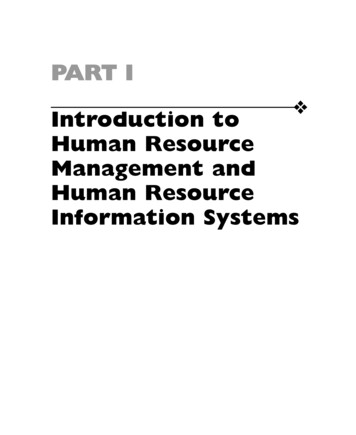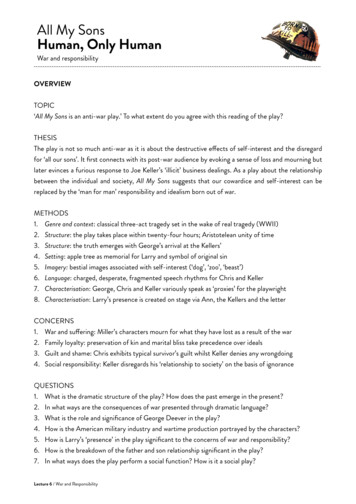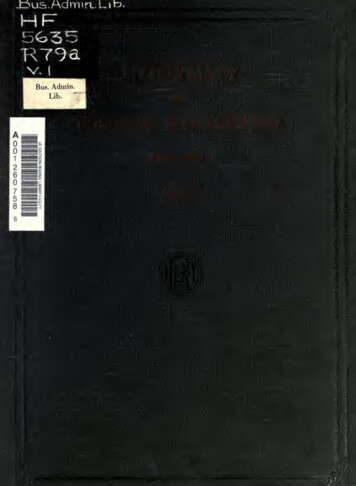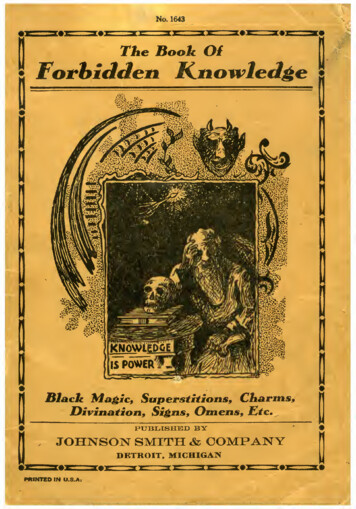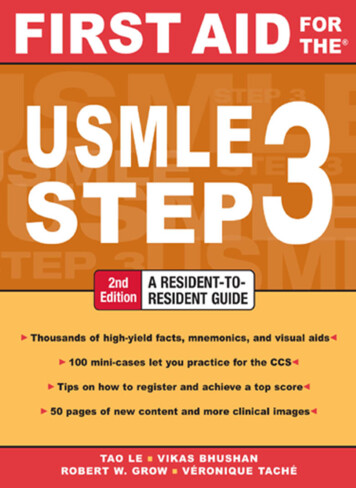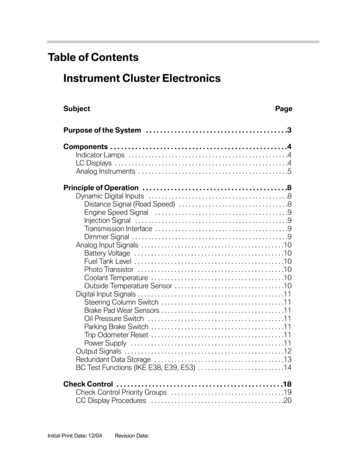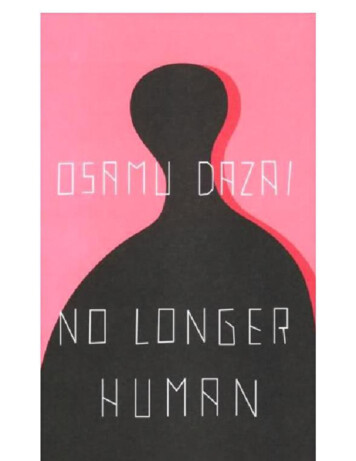
Transcription
NO LONGER HUMAN
ALSO BY OSAMU DAZAITHE SETTING SUN
NO LONGER HUMANBY OSAMU DAZAITRANSLATED BY DONALD KEENEA NEW DIRECTIONS BOOK
Copyright (c) 1958 by New Directions Publishing CorporationLibrary of Congress Catalog Card Number; 58-9509(ISBN: 41-8112-04131-21)All rights reserved. Except for brief passages quoted in a newspaper,magazine, radio, or television review, TM part of this book may bereproduced in any form or by any means. electronic or mechanical,including photocopying and recording, or by any information storage andretrieval system, without permission in writing from the Publisher.First published clothbound by New Directions in 1958First published as New Directions Paperbook :357 in 1973Published simultaneously in Canada by Penguin Books Canada LimitedManufactured in the United States of AmericaNew Directions Books are printed on acid-free paper.New Directions Books are published for James Laughlin by NewDirections Publishing Corporation80 Eighth Avenue, New York 10011TWELFTH PRINTING
ContentsCoverAlso by Osamu DazaiNO LONGER HUMANCopyright PageDedicationTranslator's IntroductionPROLOGUETHE FIRST NOTEBOOKTHE SECOND NOTEBOOKTHE THIRD NOTEBOOK : PART ONETHE THIRD NOTEBOOK : PART TWOEPILOGUE
This translation is dedicated with affection to Nancy and EdmundoLassalle
TRANSLATOR'S INTRODUCTIONI think that Osamu Dazai would have been gratified by thereviews his novel The Setting Sun received when the Englishtranslation was published in the United States. Even thoughsome of the critics were distressed by the picture the book drewof contemporary Japan, they one and all discussed it in theterms reserved for works of importance. There was no trace ofthe condescension often bestowed on writings emanating fromremote parts of the world, and for once nobody thought to usethe damning adjective "exquisite" about an unquestionablyJapanese product. It was judged among its peers, the movingand beautiful books of the present generation.One aspect of The Setting Sun puzzled many readers,however, and may puzzle others in Dazai's second novel NoLonger Human1: the role of Western culture in Japanese lifetoday. Like Yozo, the chief figure of No Longer Human, Dazaigrew up in a small town in the remote north of Japan, and wemight have expected his novels to be marked by the simplicity,love of nature and purity of sentiments of the inhabitants ofsuch a place. However, Dazai's family was rich and educated,and from his childhood days he was familiar with Europeanliterature, American movies, reproductions of modern paintingsand sculpture and much else of our civilization. These became
such important parts of his own experience that he could nothelp being influenced by them, and he mentioned them quite asfreely as might any author in Europe or America. In reading hisworks, however, we are sometimes made aware that Dazai'sunderstanding or use of these elements of the West is not alwaysthe same as ours. It is easy to conclude from this that Dazai hadonly half digested them, or even that the Japanese as a wholehave somehow misappropriated our culture.I confess that I find this parochialism curious in the UnitedStates. Here where our suburbs are jammed with a variety ofarchitecture which bears no relation to the antecedents of eitherthe builders or the dwellers; where white people sing Negrospirituals and a Negro soprano sings Lucia di Lammermoor atthe Metropolitan Opera; where our celebrated national dishes,the frankfurter, the hamburger and chow mein betray by theirvery names non-American origins: can we with honesty rebukethe Japanese for a lack of purity in their modern culture? Andcan we criticize them for borrowing from us, when we are almostas conspicuously in their debt? We find it normal that we drinktea, their beverage, but curious that they should drink whiskey,ours. Our professional decorators, without thinking to impartto us an adequate background in Japanese aesthetics, decreethat we should brighten our rooms with Buddhist statuary orwith lamps in the shapes of paper-lanterns. Yet we are apt tofind it incongruous if a Japanese ornaments his room withexamples of Christian religious art or a lamp of Venetian glass.Why does it seem so strange that another country should have aculture as conglomerate as our own?
There are, it is true, works of recent Japanese literaturewhich are relatively untouched by Western influence. Some ofthem are splendidly written, and convince us that we are gettingfrom them what is most typically Japanese in modern fiction. if,however, we do not wish to resemble the Frenchman who findsthe detective story the only worthwhile part of Americanliterature, we must also be willing to read Japanese novels inwhich a modern (by modern I mean Western) intelligence is atwork.A writer with such an intelligence—Dazai was one —may alsobe attracted to the Japanese traditional culture, but it willvirtually be with the eyes of a foreigner who finds it appealinghut remote. Dostoievski and Proust are much closer to him thanany Japanese writer of, say, the eighteenth century. Yet weshould be unfair to consider such a writer a cultural déraciné;he is not much farther removed from his eighteenth century,after all, than we are from ours. In his case, to be sure, a foreignculture has intervened, but that culture is now in its thirdgeneration in Japan. No Japanese thinks of his business suit asan outlandish or affected garb; it is not only what he normallywears, but was probably also the costume of his father andgrandfather before him. To wear Japanese garments wouldactually be strange and uncomfortable for most men. Themajority of Japanese of today wear modern Western culturealso as they wear their clothes, and to keep reminding them thattheir ancestors originally attired themselves otherwise is at oncebad manners and foolish.It may be wondered at the same time if thapanese knowledge
of the West is more than a set of clothes, however long worn orwell tailored. Only a psychologist could properly attempt toanswer so complex a question, although innumerable casualvisitors to Japan have readily opined that under the foreignexterior the Japanese remain entirely unlike ourselves. I findthis view hard to accept. It is true that the Japanese of todaydiffer from Americans—perhaps not more, however, than doGreeks or Portuguese—but they are certainly much more likeAmericans than they are like their ancestors of one hundredyears ago. As far as literature is concerned, the break with theJapanese past is almost complete.In Japanese universities today the Japanese literaturedepartment is invariably one of the smallest and leastsupported. The bright young men generally devote themselvesto a study of Western institutions or literature, and theacademic journals are filled with learned articles on thesymbolism of Leconte de Lisle or on the correspondence ofJames Knox Polk. The fact that these articles will never be readabroad, not even by specialists in Leconte de Lisle or JamesKnox Polk, inevitably creates a sense of isolation and evenloneliness among intellectuals. Some Japanese of late have takento referring to themselves as "the orphans of Asia," indicating(and perhaps lamenting) the fact that although Japan hasbecome isolated from the rest of Asia, the Western nations donot accept her literature or learning as part of their own. TheJapanese writers of today are cut off from Asian literature ascompletely as the United States is from Latin Americanliterature, by the conviction that there is nothing to learn. Thisattitude may be mistaken, but I remember how shocked a
Japanese novelist, a friend of mine, was to see his own nameincluded on a list of Lebanese, Iraqi, Burmese andmiscellaneous other Asian writers who had been sponsored byan American foundation. He would undoubtedly have preferredto figure at the tail end of a list of Western writers or of worldwriters in general than to be classed with such obscure exotics.We might like to reprimand the Japanese for the neglect oftheir own traditional culture, or to insist that Japanese writersshould be proud to be associated with other Asians, but suchadvice comes too late: as the result of our repeated and forcibleintrusions in the past, Western tastes are coming to dominateletters everywhere. The most we have reason to expect in thefuture are world variants of a single literature, of the kindwhich already exist nationally in Europe.No Longer Human is almost symbolic of the predicament ofthe Japanese writers today. It is the story of a man who isorphaned from his fellows by their refusal to take him seriously.Ile is denied the love of his father, taken advantage of by hisfriends, and finally in turn is cruel to the women who love him.He does not insist because of his experiences that the others areall wrong and he alone right. On the contrary, he records withdevastating honesty his every transgression of a code of humanconduct which he cannot fathom. Yet, as Dazai realized (if the"I" of the novel did not), the cowardly acts and moments ofabject collapse do not tell the whole story. In a superb epiloguethe only objective witness testifies, "He was an angel," and weare suddenly made to realize the incompleteness of Yozo'sportrait of himself. In the way that most men fail to see their
own cruelty, Yozo had not noticed his gentleness and hiscapacity for love.Yozo's experiences are certainly not typical of all Japaneseintellectuals, but the sense of isolation which they feel betweenthemselves and the rest of the world is perhaps akin to Yozo'sconviction that he alone is not "human." Again, his frustrationsat the university, his unhappy involvement with the CommunistParty, his disastrous love affairs, all belong to the past of manywriters of today. At the same time, detail after detail clearly isderived from the individual experience of Osamu Dazai himself.The temptation is strong to consider the book as a barelyfictionalized autobiography, but this would be a mistake, I amsure. Dazai had the creative artistry of a great cameraman. Hislens is often trained on moments of his own past, but thanks tohis brilliant skill in composition and selection his photographsare not what we expect to find cluttering an album. There isnothing of the meandering reminiscer about Dazai; with him allis sharp, brief and evocative. Even if each scene of No LongerHuman were the exact reproduction of an incident from Dazai'slife—of course this is not the ease—his technique would qualifythe whole of the work as one of original fiction.No Longer Human is not a cheerful book, yet its effect is farfrom that of a painful wound gratuitously inflicted on thereader. As a reviewer (Richard Gilman in Jubilee) wrote ofDazai's earlier novel, "Such is the power of art to transfigurewhat is objectively ignoble or depraved that The Setting Sun isactually deeply moving and even inspiriting. To know thenature of despair and to triumph over it in the ways that are
possible to oneself—imagination was Dazai's only weapon—issurely a sort of grace."Donald Keene1.The literal translation of the original title NingenShikkaku is "Disqualified as a Human Being." I have elsewherereferred to this same novel as "The Disqualified."
PROLOGUE
I have seen three pictures of the man.The first, a childhood photograph you might call it, showshim about the age of ten, a small boy surrounded by a greatmany women (his sisters and cousins, no doubt). He stands inbrightly checked trousers by the edge of a garden pond. Hishead is tilted at an angle thirty degrees to the left, and his teethare bared in an ugly smirk. Ugly? You may well question theword, for insensitive people (that is to say, those indifferent tomatters of beauty and ugliness) would mechanically commentwith a bland, vacuous expression, "What an adorable littleboy!" It is quite true that what commonly passes for "adorable"is sufficiently present in this child's face to give a modicum ofmeaning to the compliment. But I think that anyone who hadever been subjected to the least exposure to what makes for
beauty would most likely toss the photograph to one side withthe gesture employed in brushing away a caterpillar, andmutter in profound revulsion, "What a dreadful child!"Indeed, the more carefully you examine the child's smilingface the more you feel an indescribable, unspeakable horrorcreeping over you. You see that it is actually not a smiling faceat all. The boy has not a suggestion of a smile. Look at histightly clenched fists if you want proof. No human being cansmile with his fists doubled like that. It is a monkey. A grinningmonkey-face. The smile is nothing more than a puckering ofugly wrinkles. The photograph reproduces an expression sofreakish, and at the same time so unclean and even nauseating,that your impulse is to say, "What a wizened, hideous littleboy!" I have never seen a child with such an unaccountableexpression.The face in the second snapshot is startlingly unlike the first.He is a student in this picture, although it is not clear whether itdates from high school or college days. At any rate, be is nowextraordinarily handsome. But here again the face failsinexplicably to give the impression of belonging to a livinghuman being. He wears a student's uniform and a whitehandkerchief peeps from his breast pocket. He sits in a wickerchair with his legs crossed. Again be is smiling, this time not thewizened monkey's grin but a rather adroit little smile. And yetsomehow it is not the smile of a human being: it utterly lackssubstance, all of what we might call the "heaviness of blood" orperhaps the "solidity of human life"—it has not even a bird'sweight. It is merely a blank sheet of paper, light as a feather,
and it is smiling. The picture produces, in short, a sensation ofcomplete artificiality. Pretense, insincerity, fatuousness—noneof these words quite covers it. And of course you couldn'tdismiss it simply as dandyism. In fact, if you look carefully youwill begin to feel that there is something strangely unpleasantabout this handsome young man. I have never seen a youngman whose good looks were so baffling.The remaining photograph is the most monstrous of all. It isquite impossible in this one even to guess the age, though thehair seems to be streaked somewhat with grey. It was taken in acorner of an extraordinarily dirty room (you can plainly see inthe picture how the wall is crumbling in three places). His smallhands are held in front of him. This time he is net smiling.There is no expression whatsoever. The picture has a genuinelychilling, foreboding quality, as if it caught him in the act ofdying as he sat before the camera, his hands held over a heater.That is not the only shocking thing about it. The head is shownquite large, and you can examine the features in detail: theforehead is average, the wrinkles on the forehead average, theeyebrows also average, the eyes, the nose, the mouth, the chin . . the face is not merely devoid of expression, it fails even to leavea memory. It has no individuality. I have only to shut my eyesafter looking at it to forget the face. I can remember the wall ofthe room, the little heater, but all impression of the face of theprincipal figure in the room is blotted out; I am unable to recalla single thing about it. This face could never be made thesubject of a painting, not even of a cartoon. I open my eyes.There is not even the pleasure of recollecting: of course, that'sthe kind of face it was! To state the matter in the most extreme
terms: when I open my eyes and look at the photograph asecond time I still cannot remember it. Besides, it rubs againstme the wrong way, and makes me feel so uncomfortable that inthe end I want to avert my eyes.I think that even a death mask would hold more of anexpression, leave more of a memory. That effigy suggestsnothing so much as a human body to which a horse's head hasbeen attached. Something ineffable makes the beholder shudderin distaste. I have never seen such an inscrutable face on a man.
THE FIRST NOTEBOOK
Mine has been a life of much shame.I can't even guess myself what it must be to live the life of ahuman being. I was born in a village in the Northeast, and itwasn't until I was quite big that I saw my first train. I climbedup and down the station bridge, quite unaware that its functionwas to permit people to cross from one track to another. I wasconvinced that the bridge had been provided to lend an exotictouch and to make the station premises a place of pleasantdiversity, like some foreign playground. I remained under thisdelusion fur quite a long time, and it was for use a very refinedamusement indeed to climb up and down the bridge.I thought that it was one of the most elegant services providedby the railways. When later l discovered that the bridge was
nothing more than a utilitarian device, I lost all interest in it.Again, when as a child I saw photographs of subway trains inpicture books, it never occurred to me that they had beeninvented out of practical necessity; I could only suppose thatriding underground instead of on the surface must be a noveland delightful pastime.I have been sickly ever since I was a child and havefrequently been confined to bed. How often as I lay there I usedto think what uninspired decorations sheets and pillow casesmake. It wasn't until I was about twenty that I realized that theyactually served a practical purpose, and this revelation ofhuman dullness stirred dark depression in me.Again, I have never known what it means to be hungry. Idon't mean by this statement that I was raised in a well-to-dofamily—I have no such banal intent. I mean that I have had notthe remotest idea of the nature of the sensation of "hunger." Itsounds peculiar to say it, but I have never been aware that mystomach was empty. When as a boy I returned home fromschool the people at home would make a great fuss over me."You must be hungry. We remember what it's like, how terriblyhungry you feel by the time you get home from school. Howabout some jelly beans? There's cake and biscuits too." Seekingto please, as I invariably did, I would mumble that was hungry,and stuff a dozen jelly beans in my mouth, but what they meantby feeling hungry completely escaped me.Of course I do eat a great deal all the same, but I have almostno recollection of ever having done so out of hunger. Unusual
or extravagant things tempt me, and when I go to the house ofsomebody else I eat almost everything put before me, even if ittakes some effort. As a child the most painful part of the daywas unquestionably mealtime, especially in my own home.At my house in the country the whole family —we were aboutten in number—ate together, lined up in two facing rows attable. Being the youngest child I naturally sat at the end. Thedining room was dark, and the sight of the ten or more membersof the household eating their lunch, or whatever the meal was,in gloomy silence was enough to send chills through me.Besides, this was an old-fashioned country household where thefood was more or less prescribed, and it was useless even tohope for unusual or extravagant dishes. I dreaded mealtimemore each day. I would sit there at the end of the table in thedimly lit room and, trembling all over as with the told, I wouldlift a few morsels of food to my mouth and push them in. "Whymust human beings cat three meals every single day? Whatextraordinarily solemn faces they all make as they eat! It seemsto be some kind of ritual. Three times every day at the regulatedhour the family gathers in this gloomy room. The places are alllaid out in the proper order and, regardless of whether we'rehungry or not, we munch our food in silence, with lowered eyes.Who knows? It may be an act of prayer to propitiate whateverspirits may be lurking around the house. . . ." At times I went sofar as to think in such terms.Eat or die, the saying goes, but to my ears it sounded like justone more unpleasant threat. Nevertheless this superstition (Icould only think of it as such) always aroused doubt and fear in
me. Nothing was so hard for me to understand, so baffling, andat the same time so filled with menacing overtones as thecommonplace remark, "Human beings work to earn theirbread, for if they don't eat, they die."In other words, you might say that I still have nounderstanding of what makes human beings tick. Myapprehension on discovering that my concept of happinessseemed to be completely at variance with that of everyone elsewas so great as to make me toss sleeplessly and groan night afternight in my bed. It drove me indeed to the brink of lunacy. Iwonder if I have actually been happy. People have told me,really more times than I can remember, ever since I was a smallboy, how lucky I was, but I have always felt as if I were sufferingin hell. It has seemed to me in fact that those who called melucky were incomparably more fortunate than I.I have sometimes thought that I have been burdened with apack of ten misfortunes, any one of which if borne by myneighbor would be enough to make a murderer of him.I simply don't understand. I have not the remotest clue whatthe nature or extent of my neighbor's woes can be. Practicaltroubles, griefs that can be assuaged if only there is enough toeat—these may be the most intense of all burning hells, horribleenough to blast to smithereens my ten misfortunes, but that isprecisely what I don't understand: if my neighbors manage tosurvive without killing themselves, without going mad,maintaining an interest in political parties, not yielding todespair, resolutely pursuing the fight for existence, can theirgriefs really be genuine? Am I wrong in thinking that these
people have become such complete egoists and are so convincedof the normality of their way of life that they have never oncedoubted themselves? if that is the case, their sufferings shouldhe easy to hear: they are the common lot of human beings andperhaps the best one can hope for. I don't know . If you'veslept soundly at night the morning is exhilarating, I suppose.What kind of dreams do they have? What. do they think aboutwhen they walk along the street? Money? Hardly—it couldn'tonly be that. I seem to have heard the theory advanced thathuman beings live in order to eat, but I've never heard anyonesay that they lived in order to make money. No. And yet, insome instances. . . . No, I don't even know that. . . . The more Ithink of it, the less I understand. All I feel are the assaults ofapprehension and terror at the thought that I am the only onewho is entirely unlike the rest. It is almost impossible for me toconverse with other people. What should I talk about, howshould I say it?—I don't know.This was how I happened to invent my clowning.It was the last quest for love I was to direct at human beings.Although I had a mortal dread of human beings I seemed quiteunable to renounce their society. I managed to maintain on thesurface a smile which never deserted my lips; this was theaccommodation I offered to others, a most precariousachievement performed by me only at the cost of excruciatingefforts within.As a child I had absolutely no notion of what others, evenmembers of my own family, might be suffering or what theywere thinking. I was aware only of my own unspeakable fears
and embarrassments. Before anyone realized it, I had becomean accomplished clown, a child who never spoke a singletruthful word.I have noticed that in photographs of me taken about thattime together with my family, the others all have serious faces;only mine is invariably contorted into a peculiar smile. This wasone more variety of my childish, pathetic antics.Again, I never once answered back anything said to me by myfamily. The least word of reproof struck me with the force of athunderbolt and drove me almost out of my head. Answer back!Far from it, I felt convinced that their reprimands were withoutdoubt voices of human truth speaking to me from eternitiespast; I was obsessed with the idea that since I lacked thestrength to act in accordance with this truth, I might alreadyhave been disqualified from living among human beings. Thisbelief made me incapable of arguments or self-justification.Whenever anyone criticized me I felt certain that I had beenliving under the most dreadful misapprehension. I alwaysaccepted the attack in silence, though inwardly so terrified asalmost to be out of my mind.It is true, I suppose, that nobody finds it exactly pleasant tobe criticized or shouted at, but I see in the face of the humanbeing raging at me a wild animal in its true colors, one morehorrible than any lion, crocodile or dragon. People normallyseem to be hiding this true nature, but an occasion will arise (aswhen an ox sedately ensconced in a grassy meadow suddenlylashes out with its tail to kill the horsefly on its flank) whenanger makes them reveal in a flash human nature in all its
horror. Seeing this happen has always induced in me a feargreat enough to make my hair stand on end, and at the thoughtthat this nature might be one of the prerequisites for survival asa human being, I have come close to despairing of myself.I have always shook with fright before human beings. Unableas I was to feel the least particle of confidence in my ability tospeak and act like a human being, I kept my solitary agonieslocked in my breast. I kept my melancholy and my agitationhidden, careful lest any trace should be left exposed. I feignedan innocent optimism; I gradually perfected myself in the roleof the farcical eccentric.I thought, "As long as I can make them laugh, it doesn'tmatter how, I'll be all right. If I succeed in that, the humanbeings probably won't mind it too much if I remain outsidetheir lives. The one thing I must avoid is becoming offensive intheir eyes: I shall be nothing, the wind, the sky." My activitiesas jester, a role born of desperation, were extended even to theservants, whom I feared even more than my family because Ifound them incomprehensible.In the summer I made everybody laugh by saunteringthrough the house wearing a red woolen sweater under mycotton kimono. Even my elder brother, who was rarely given tomirth, burst out laughing and commented in intolerablyaffectionate tones, "That doesn't look so good on you, Yozo."But for all my follies I was not so insensitive to heat and cold asto walk around in a woolen sweater at the height of summer. Ihad pulled my little sister's leggings over my arms, letting justenough stick out at the opening of the sleeves to give the
impression that I was wearing a sweater.My father frequently had business in Tokyo and maintaineda town house for that reason. He spent two or three weeks of themonth at a time in the city, always returning laden with a reallystaggering quantity of presents, not only for members of ourimmediate family, but even for our relatives. It was a kind ofhobby on his part. Once, the night before he was to leave forTokyo, he summoned all the children to the parlor andsmilingly asked us what present we would like this time,carefully noting each child's reply in a little book. It was mostunusual for Father to behave so affectionately with thechildren."How about you, Yozo?" he asked, but I could only stammeruncertainly.Whenever I was asked what I wanted my first impulse was toanswer "Nothing." The thought went through my mind that itdidn't make any difference, that nothing was going to make mehappy. At the same time I was congenitally unable to refuseanything offered to me by another person, no matter how littleit might suit my tastes. When I hated something, I could notpronounce the words, "I don't like it." When I liked somethingI tasted it hesitantly, furtively, as though it were extremelybitter. In either case I was torn by unspeakable fear. In otherwords, I hadn't the strength even to choose between twoalternatives. In this fact, I believe, lay one of the characteristicswhich in later years was to develop into a major cause of my"life of shame."
I remained silent, fidgeting. My father lost a little of his goodhumor."Will it be a book for you? Or how about a mask for the NewYear lion dance? They sell them now in children's sizes.Wouldn't you like one?"The fatal words "wouldn't you like one?" made it quiteimpossible for me to answer. I couldn't even think of anysuitably clownish response. The jester had completely failed."A book would be best, I suppose," my brother saidseriously."Oh?" The pleasure drained from my father's face. Hesnapped his notebook shut without writing anything.What a failure. Now I had angered my father and I could besure that his revenge would he something fearful. That night asI lay shivering in bed I tried to think if there were still not someway of redressing the situation. I crept out of bed, tiptoed downto the parlor, and opened the drawer of the desk where myfather had most likely put his notebook. I found the book andtook it out. I riffled through the pages until I came to the placewhere he had jotted down our requests for presents. I licked thenotebook pencil and wrote in big letters LION MASK. Thisaccomplished I returned to my bed. I had not the faintest wishfor a lion mask. In fact, I would actually have preferred a book.But it was obvious that Father wanted to buy me a mask, andmy frantic desire to cater to his wishes and restore his goodhumor had emboldened me to sneak into the parlor in the deadof night.
This desperate expedient was rewarded by the great success Ihad hoped for. When, some days later, my father returned fromTokyo I overheard him say to Mother in his loud voice—I wasin the children's room at the time—"What do you think I foundwhen I opened my notebook in the toy shop? See, somebody haswritten here 'lion mask.' It's not my handwriting. For a minuteI couldn't figure it out, then it came to me. This was some ofYozo's mischief. You know, I asked him what he wanted fromTo
and beautiful books of the present generation. One aspect of The Setting Sun puzzled many readers, however, and may puzzle others in Dazai's second novel No Longer Human1: the role of Western culture in Japanese life today. Like Yozo, the chief figure of No Longer Human, Dazai gre

